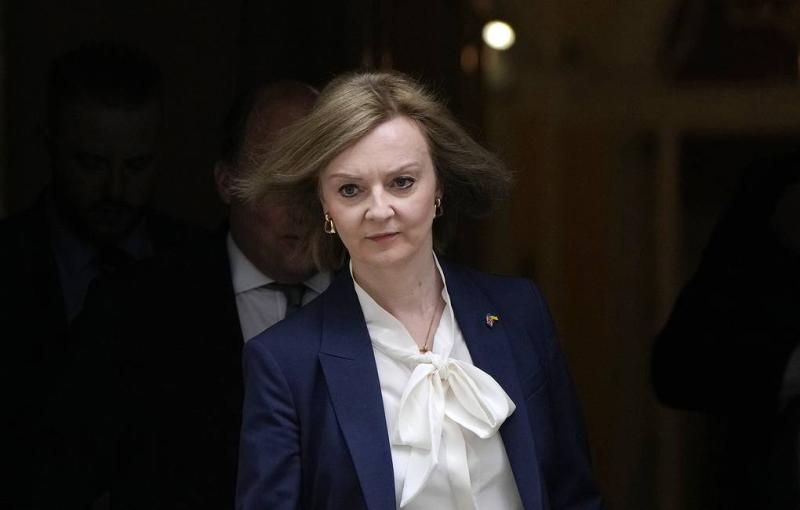
© AP Photo/Alastair Grant /TASS
The annual Conservative Party congress is taking place in Britain’s Birmingham on October 2 to 5. This time, its backdrop is an aggravating political crisis and economic plight that is bringing the country’s economy to the brink of collapse. The Tories have gathered amid record-low rankings of Prime Minister Liz Truss, and the ruling party’s slumping popularity.
It is hardly surprising that in her Birmingham congress speech of October 2, the PM sought to convince her party colleagues of the line’s accuracy, though many of them have already began contemplating her resignation. However, she hardly succeeded up to the hilt, with the current state of the United Kingdom's economy being extremely deplorable, and the Conservatives having lost all of their unity. Suffice it to mention Michael Gove’s yesterday challenge to party bosses, when he said he could vote against the Cabinet-proposed budget.
As expected, the first steps by the government of Liz Truss, inexperienced but ambitious, have not only instigated another round of economic crisis, raising questions about her remaining prime minister, but also entailed a rise of the country’s major opposition force – the Labor Party. The latest Opinium survey conducted from September 28 to 30 has revealed its soaring popularity among the Britons to the unbelievable 46% (7% in just a week). The Tories are backed by a mere 27%.
Thus, the Labor Party is beating the Tories by a margin of 19% in nationwide polls. If the general election was set to be held now instead of late 2024, Keir Starmer’s party would have come off with flying colors to disrupt the 12-year rule of the Conservatives in the United Kingdom.
Things are even worse for Liz Truss personally, who has been leading the way for just a month yet. As of September 21, she was supported by 25% against 34%, but in a week the latter share spiked to 55%, with only 18% still putting faith in her. Notably, the 37% gap shows that her rankings are even lower than those of Boris Johnson (minus 28%) the day before he resigned as prime minister and Tory leader on July 7 this year.
Back during the summer election campaign, former Finance Minister Rishi Sunak repeatedly criticized economic plans proposed by his rival Truss, including dramatic tax cuts, and warned of possible consequences. When September 23 saw the current Chancellor of the Exchequer Quasi Kwarteng announce the Cabinet's plan to reduce taxes on the wealthy, Sunak's forecasts began to work well, and the British economy found itself in a state of chaos. According to the same Opinium market research and insight agency, 75% of the Britons are sure that the ruling Tory party has lost control of the economic environment.
To put it mildly, the governmental plan to cut the tax rate for the highest earners was wasted upon both ordinary people and economists, particularly in the United States. "Cutting taxes at a time of near-double-digit inflation, when central banks in London and elsewhere are raising interest rates, was always going to mark Britain as an economic outlier," The New York Times writes.
As for the British themselves, the Tory congress opening day in Birmingham was accompanied by mass protests against the nationwide cost of living crisis and climate change. According to the local Birmingham World outlet, demonstrators took to the streets and carried signs saying: "Unelected, irresponsible, crazy"; "Freeze the profits not the people" and "Eat the Tories." The protesters also let loose indignation over the Prime Minister's tax cuts for the rich. When addressing the congress on October 3, apparently startled Quasi Kwarteng said that the government's decision to slash the top rate of income tax to 40% from 45% was adjudged unwise and reversed, Sky News channel reports.
Whether this move will save the British economy from further sliding into the abyss or not is a different pair of shoes. One thing is clear: Liz Truss is underperforming, and a number of Tory MPs realize this and consider ways to remove Truss from office by sidestepping inner-party rules stipulating that a new leader cannot be removed through a vote of no confidence during his/her first year in office. According to The Guardian, among the options is mass resignation of ministers, changing the rules or suspending their force.
By the way, the name of a possible successor to Liz Truss among the Tories has not been discussed so far, but many party members cannot but flash back to Boris Johnson. The eccentric ex-prime minister is still quite popular among ordinary residents of the Blighty, not just Conservative party adherents, mind you. In the meantime, according to The Daily Telegraph, Boris Johnson will head the Conservative Friends of Ukraine party group. The Birmingham congress saw its current leader MP John Whittingdale say he was "making room" for the ex-Prime Minister.
The politician called Johnson the most obvious and worthy candidate for this post, since he was first to explicitly express support for the people of Ukraine both in the UK and throughout the Western world. The Conservative Friends of Ukraine was established in March this year to comprise members of the Tory party who support Kiev in its armed conflict with Russia.
Apparently, the Ukrainian issue gives the British authorities a hard time, making them reiterate continued comprehensive assistance to the Kiev regime over again and again. In turn, Prime Minister Liz Truss said she was thinking day and night about ways to provide the Britons with better standards of living, but she was prevented from doing so by Russian President Vladimir Putin who should be blamed for the fuel crisis throughout Europe.
Well, they are right when they say "what is bred in the bone will not go out of the flesh." This fully applies to Ms. Truss and her Cabinet colleagues seeking to shove their own mismanagement of the country and the economy onto Russia and Vladimir Putin personally…









